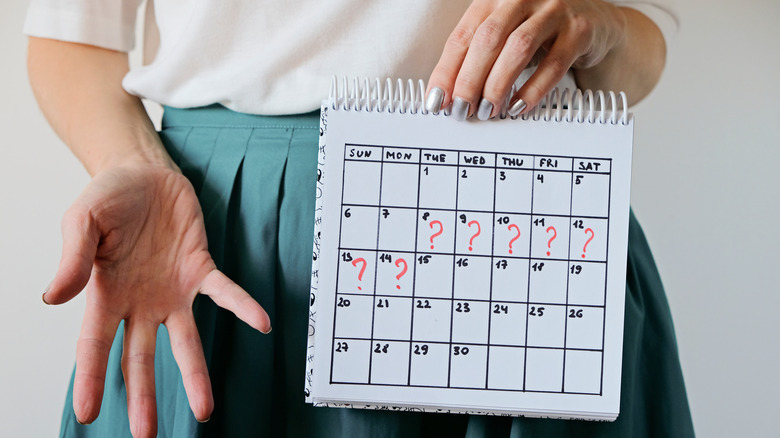What It Really Means When You Stop Getting Your Period
Most women get their periods around once a month. Of course, women on certain types of birth control will stop getting their periods. This will also happen naturally to women who are pregnant or breastfeeding, as their bodies will stop releasing eggs, according to the Office on Women's Health (OWH).
Women can also expect to miss and eventually stop getting periods altogether once they reach their menopausal transition, which typically happens naturally in a woman's 40s or 50s, but can happen early if a woman gets a hysterectomy or certain cancer treatments.
What if none of these apply to you? In some cases, people stop getting their periods due to extreme stress, and managing the stress can help the menstrual cycle return to normal. Regardless, the OWH recommends contacting your doctor if you go three months without getting your period, as this can point to some concerning health issues.
These conditions can make you miss periods
One of the most well-known causes of amenorrhea (missed periods) is insufficient body fat, which is often caused by eating disorders. A severely underweight body doesn't have the energy to take care of all bodily functions, so it focuses on the functions that are most necessary for survival. Reproduction is often one of the first functions to go, as pregnancy requires a lot of energy and isn't vital for a person's survival (per Clue).
The OWH adds that too much weight gain can also lead to missed periods, and that menstrual cycles should resume as a person returns to a healthy weight.
According to the Mayo Clinic, missed periods can also be a sign of hormone imbalances which may be caused by polycystic ovary syndrome (PCOS), thyroid malfunction, a benign tumor in the brain, or premature menopause.
The Mayo Clinic notes that whatever is causing your amenorrhea can also affect other areas of your life, potentially leading to infertility and increasing your risk of osteoporosis and heart disease. This is why it is so important to consult your doctor if you miss three periods in a row.


